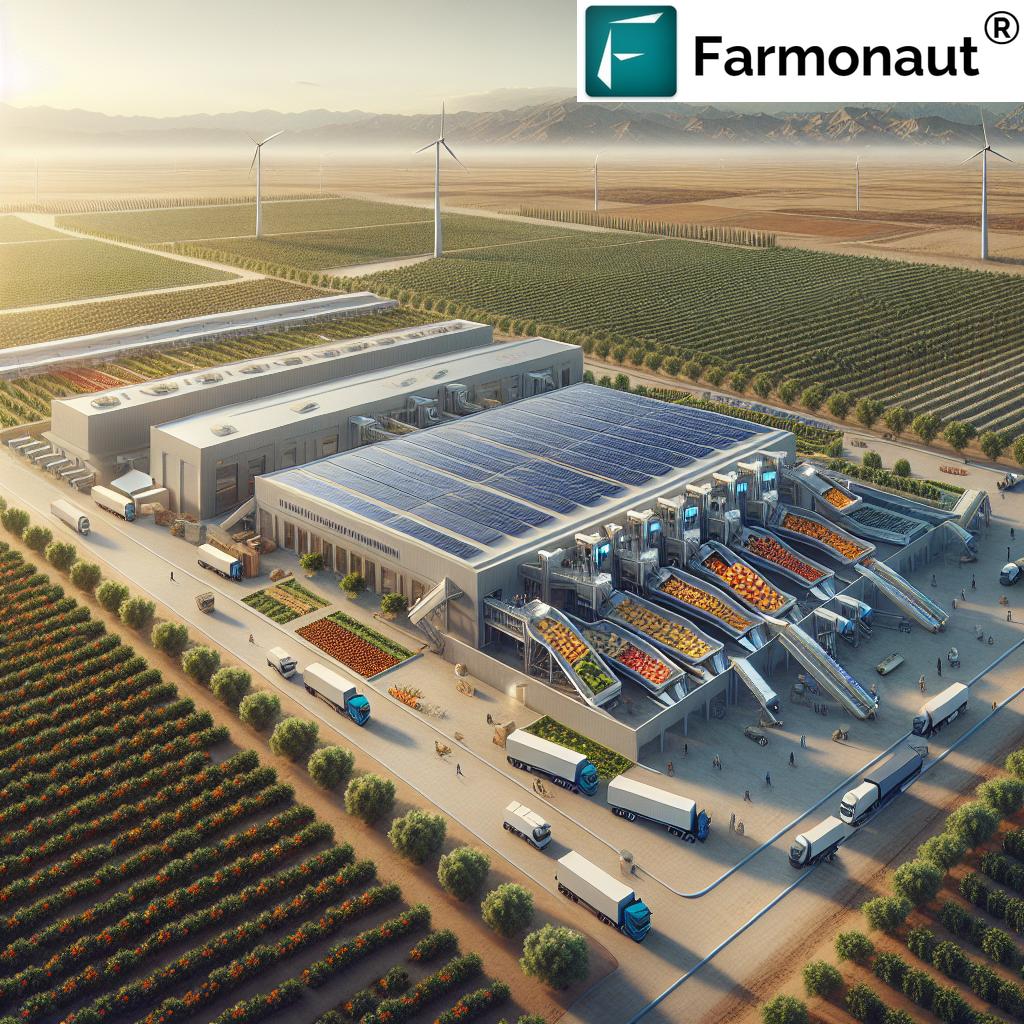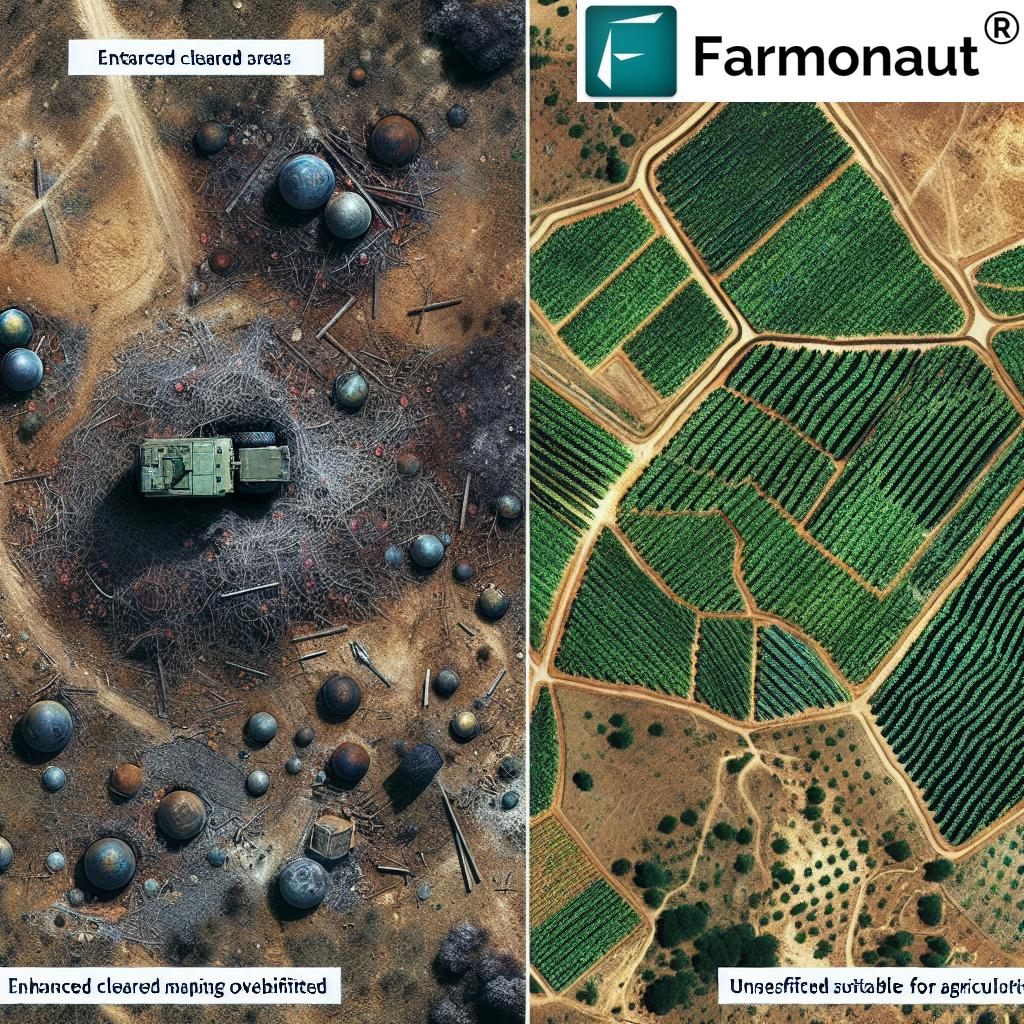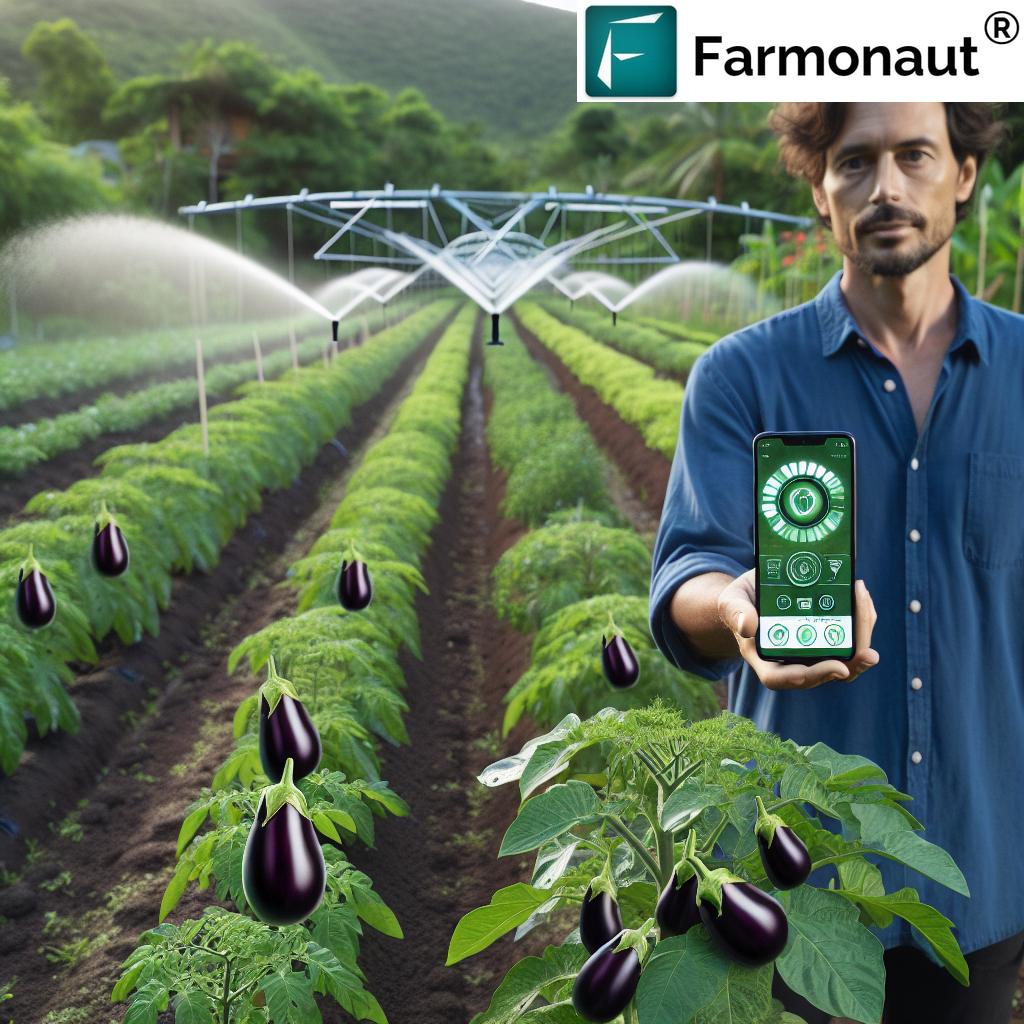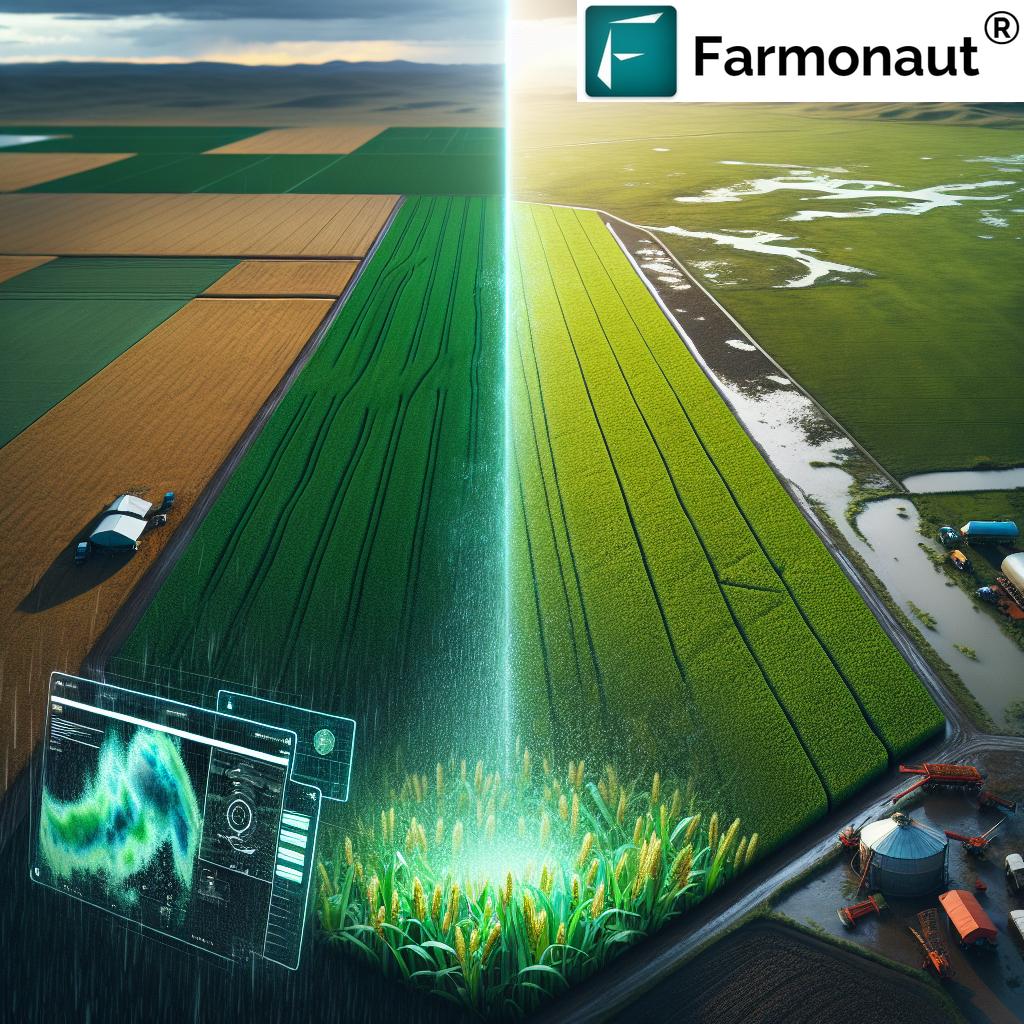Revolutionizing Central Asian Agriculture: Sustainable Practices and Digital Innovation in Kazakhstan, Uzbekistan, and Kyrgyzstan
“Kazakhstan plans to expand its irrigated land area by 600,000 hectares by 2030, boosting agricultural productivity.”
Welcome to an in-depth exploration of the agricultural revolution unfolding in Central Asia. In this comprehensive article, we at Farmonaut will delve into the remarkable advancements in sustainable agriculture and digital innovation taking place in Kazakhstan, Uzbekistan, and Kyrgyzstan. As pioneers in satellite-based farm management solutions, we’re excited to share our insights on how these countries are transforming their agricultural sectors through cutting-edge practices and technologies.

The Dawn of Agricultural Digitalization in Central Asia
The agricultural landscape in Central Asia is undergoing a profound transformation, with agricultural digitalization at the forefront of this change. Kazakhstan, Uzbekistan, and Kyrgyzstan are embracing innovative technologies to enhance productivity, ensure food security, and promote sustainable farming practices.
- Kazakhstan: Leading the digital agriculture revolution with smart farming initiatives
- Uzbekistan: Implementing digital platforms for crop monitoring and management
- Kyrgyzstan: Adopting mobile apps for agricultural information dissemination
As experts in remote sensing and GIS technology, we at Farmonaut recognize the immense potential of digital tools in revolutionizing farm management. Our satellite-based crop health monitoring system aligns perfectly with the growing trend of digitalization in Central Asian agriculture.
Water-Saving Technologies: A Game-Changer for Central Asian Agriculture
In a region where water scarcity is a pressing concern, the adoption of water-saving technologies in farming has become crucial. Central Asian countries are making significant strides in this area:
- Drip irrigation systems in Uzbekistan’s cotton fields
- Precision irrigation techniques in Kazakhstan’s wheat farms
- Water-efficient greenhouses in Kyrgyzstan’s vegetable production
These innovative approaches not only conserve precious water resources but also contribute to increased crop yields and improved product quality. At Farmonaut, we support these efforts through our advanced soil moisture monitoring capabilities, helping farmers make informed decisions about irrigation scheduling.
Expanding Irrigated Lands: Boosting Agricultural Productivity
One of the most ambitious initiatives in Central Asian agriculture is the expansion of irrigated land. This strategy aims to increase arable land and enhance crop production:
- Kazakhstan’s plan to add 600,000 hectares of irrigated land by 2030
- Uzbekistan’s efforts to rehabilitate existing irrigation systems
- Kyrgyzstan’s projects to develop new irrigation networks in rural areas
These expansions present both opportunities and challenges. While they promise increased agricultural output, they also require careful management to ensure sustainability. Farmonaut’s satellite imagery analysis can play a crucial role in monitoring these newly irrigated areas, helping to optimize resource use and prevent environmental degradation.
Explore Farmonaut’s API for advanced satellite data analysis
Enhancing Food Safety and Phytosanitary Standards
As Central Asian countries aim to boost their agricultural exports, improving food safety regulations and phytosanitary standards has become a top priority. This focus is crucial for accessing international markets and ensuring consumer safety:
- Implementation of stricter food safety controls in Kazakhstan’s dairy industry
- Upgrading of laboratory facilities for phytosanitary testing in Uzbekistan
- Development of farm-to-fork traceability systems in Kyrgyzstan
These efforts are complemented by Farmonaut’s blockchain-based traceability solutions, which can help ensure transparency and build trust in the agricultural supply chain.
“Central Asian countries aim to increase agricultural exports by 20% through improved food safety and phytosanitary standards.”
Agricultural Cooperative Development: Strengthening Rural Communities
The growth of agricultural cooperatives is playing a vital role in the transformation of Central Asian agriculture. These cooperatives are empowering small-scale farmers and promoting rural development:
- Formation of dairy cooperatives in Kazakhstan to improve milk collection and processing
- Establishment of fruit and vegetable cooperatives in Uzbekistan for better market access
- Creation of seed production cooperatives in Kyrgyzstan to enhance crop quality
At Farmonaut, we recognize the importance of these collective efforts. Our platform is designed to be accessible and beneficial for both individual farmers and cooperatives, providing valuable insights for improved crop management and decision-making.
Agribusiness Innovation: Driving Sector Growth
Agribusiness innovation is at the heart of Central Asia’s agricultural transformation. From smart farming technologies to innovative processing techniques, the region is embracing change:
- Adoption of precision agriculture techniques in Kazakhstan’s large-scale farms
- Development of agro-processing clusters in Uzbekistan
- Implementation of IoT solutions in Kyrgyzstan’s greenhouse sector
These innovations are creating new opportunities for growth and efficiency in the agricultural sector. Farmonaut’s AI-powered advisory system, Jeevn AI, aligns perfectly with this trend, offering personalized recommendations to farmers based on real-time data analysis.
Agricultural Diversification Strategies: Ensuring Food Security
Central Asian countries are actively pursuing agricultural diversification strategies to reduce dependency on traditional crops and enhance food security:
- Kazakhstan’s push towards oilseed production alongside wheat
- Uzbekistan’s efforts to expand fruit and vegetable cultivation
- Kyrgyzstan’s focus on developing its livestock sector
This diversification not only helps in meeting domestic food needs but also opens up new export opportunities. Farmonaut’s multispectral satellite imagery analysis can assist farmers in monitoring the health and progress of these diverse crops, ensuring optimal yields across different agricultural products.
Access our API Developer Docs for integrating satellite data into your agricultural solutions
Sustainable Farming Techniques: Balancing Productivity and Conservation
The adoption of sustainable farming techniques is gaining momentum across Central Asia, as countries strive to balance agricultural productivity with environmental conservation:
- Implementation of conservation tillage practices in Kazakhstan
- Promotion of organic farming methods in Uzbekistan
- Development of agroforestry systems in Kyrgyzstan
These sustainable practices are crucial for preserving soil health, conserving water resources, and mitigating the impacts of climate change. Farmonaut’s platform supports these efforts by providing farmers with insights into soil health and vegetation indices, enabling more sustainable resource management.

Marketing Initiatives for Fruits and Vegetables: Boosting Exports
Central Asian countries are placing a strong emphasis on marketing their agricultural products, particularly fruits and vegetables, to increase exports and create value-added opportunities:
- Kazakhstan’s branding of its organic produce for premium markets
- Uzbekistan’s participation in international food expos to showcase its melons and stone fruits
- Kyrgyzstan’s development of niche markets for its high-altitude honey and berries
These marketing efforts are crucial for establishing Central Asian agricultural products in the global marketplace. Farmonaut’s traceability solutions can add value to these initiatives by providing consumers with transparent information about the origin and quality of these products.
Comparative Analysis: Agricultural Innovation in Central Asian Countries
To provide a clear overview of the agricultural advancements in Kazakhstan, Uzbekistan, and Kyrgyzstan, we’ve compiled a comparative table highlighting key areas of innovation:
| Country | Digital Agriculture Adoption (%) | Water-Saving Technology Implementation (%) | Irrigated Land Expansion (hectares) | Food Safety Regulation Strength (scale 1-10) | Agricultural Export Value (USD millions) | Sustainable Farming Techniques Adopted (number) |
|---|---|---|---|---|---|---|
| Kazakhstan | 45 | 30 | 600,000 | 8 | 3,500 | 12 |
| Uzbekistan | 35 | 40 | 300,000 | 7 | 2,800 | 15 |
| Kyrgyzstan | 25 | 20 | 100,000 | 6 | 800 | 10 |
This table illustrates the varying degrees of progress in different aspects of agricultural innovation across the three countries. It’s clear that while each nation has its strengths, there’s still significant room for growth and improvement in various areas.
The Role of Technology in Overcoming Agricultural Challenges
As Central Asian countries strive to modernize their agricultural sectors, technology plays a crucial role in addressing various challenges:
- Climate change adaptation through precision agriculture
- Efficient resource management using IoT and sensor technologies
- Improved crop yield prediction with AI and machine learning
- Enhanced market access through digital platforms and e-commerce
Farmonaut’s suite of technologies, including our satellite-based crop health monitoring and AI advisory system, are well-positioned to support these technological advancements in Central Asian agriculture.
Environmental Conservation and Sustainable Growth
Balancing agricultural growth with environmental conservation is a key priority for Central Asian countries. Sustainable practices being implemented include:
- Reforestation projects in Kazakhstan to combat desertification
- Promotion of biodiversity in Uzbekistan’s cotton fields
- Development of eco-tourism linked to sustainable agriculture in Kyrgyzstan
These initiatives demonstrate the region’s commitment to sustainable development. Farmonaut’s carbon footprinting feature can assist agribusinesses in monitoring and reducing their environmental impact, aligning with these conservation efforts.
The Future of Central Asian Agriculture
As we look to the future, several trends are likely to shape the agricultural landscape in Central Asia:
- Increased adoption of smart farming technologies
- Greater focus on value-added processing of agricultural products
- Expansion of organic and niche product markets
- Enhanced regional cooperation in agricultural research and development
These trends present exciting opportunities for growth and innovation in the sector. Farmonaut is committed to supporting this agricultural transformation through our cutting-edge satellite technology and data-driven insights.
Conclusion: A New Era for Central Asian Agriculture
The agricultural sectors of Kazakhstan, Uzbekistan, and Kyrgyzstan are on the cusp of a major transformation. Through the adoption of sustainable practices, digital innovation, and forward-thinking policies, these countries are positioning themselves as emerging leaders in modern agriculture.
As we’ve explored in this article, the integration of technologies like satellite monitoring, AI-driven advisory systems, and blockchain-based traceability solutions is playing a crucial role in this transformation. At Farmonaut, we’re proud to be at the forefront of this technological revolution, offering tools and insights that can help farmers and agribusinesses throughout Central Asia to thrive in this new era of agriculture.
The journey towards fully sustainable and digitalized agriculture in Central Asia is ongoing, but the progress made so far is truly impressive. As these countries continue to innovate and adapt, they are not only ensuring their own food security but also contributing to global agricultural advancements.
We invite farmers, agribusinesses, and policymakers in Central Asia to explore how Farmonaut’s satellite-based solutions can support their agricultural goals. Together, we can continue to drive innovation, sustainability, and prosperity in this vital sector.
FAQ: Central Asian Agriculture and Innovation
Q1: What are the main challenges facing agriculture in Central Asia?
A1: The main challenges include water scarcity, climate change impacts, outdated infrastructure, and the need for modernization of farming practices.
Q2: How is digital technology transforming agriculture in the region?
A2: Digital technologies are enabling precision farming, improving resource management, enhancing crop monitoring, and facilitating better market access for farmers.
Q3: What role does sustainable agriculture play in Central Asia’s future?
A3: Sustainable agriculture is crucial for ensuring long-term food security, conserving natural resources, and adapting to climate change in the region.
Q4: How are Central Asian countries improving their agricultural exports?
A4: They are focusing on enhancing food safety standards, improving product quality, diversifying crops, and developing marketing strategies for international markets.
Q5: What opportunities exist for agtech companies in Central Asia?
A5: There are significant opportunities in areas such as precision agriculture, water-saving technologies, digital farm management systems, and traceability solutions.




















